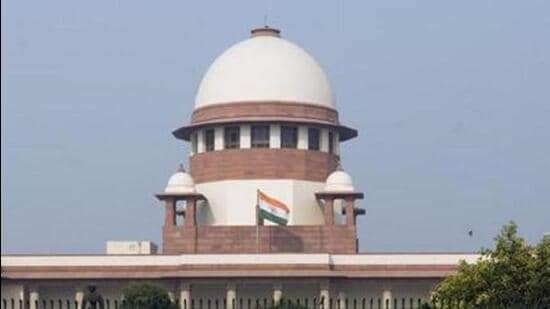Govt, RBI defend demonetisation in affidavits filed before Supreme Court
Defending the move before a constitution bench, the government claimed that while the demonetisation decision resulted in several “perceptible benefits” .
The 2016 demonetisation policy was a critical step in a series of transformational economic policies which helped to not only combat the menace of counterfeit currency, terror financing, black money and tax evasion, but also nudged large sections of the informal economy to become part of the formal economy, the Union government told the Supreme Court on Wednesday.

The Reserve Bank of India (RBI), in its affidavit filed separately before the top court, too justified the move to take currency notes of ₹500 and ₹1,000 denominations out of circulation, contending that the inconvenience caused to the public cannot be a ground to challenge the validity of demonetisation when the decision was taken in “national economic interest”.
Defending the move before a constitution bench, the government claimed that while the demonetisation decision resulted in several “perceptible benefits” in the form of checking counterfeit currency and significant increase in digital transactions and income tax compliance,its impact on India’s economic growth was “transient”.
“The overall impact of the withdrawal of the legal tender character of the SBNs (specified bank notes) on economic growth was transient, with the real growth rate being 8.2% in FY 16-17 and 6.8% in FY 17-18 --both being more than the decadal growth rate of 6.6% in the pre-pandemic years,” stated the Centre’s affidavit.
To be sure, many economists have flagged demonetistion (2016) and Goods and Services Tax (GST; 2017) as the reasons for the economy slowing . Former RBI governor Raghuram Rajan, at a public event in November 2018, said: “Two successive shocks of demonetisation and the GST had a serious impact on growth in India.”
Over three dozen petitions have been filed against the Centre’s November 8, 2016, decision, accusing it of violating fundamental rights and being contrary to the law laid down under the RBI Act, 1934.
A constitution bench, on October 12, asked the Centre and RBI to submit their affidavits in the matter, explicating the decision-making process behind the policy. The five-judge bench, on that day, turned down the government’s plea to shut the proceedings by declaring them infructuous and an academic exercise, saying it was a “serious matter”.
Submitting its affidavit, the government called demonetisation “a major step to fight the menace of fake currency notes, storage of unaccounted wealth and financing of subversive activities”.
“The nation underwent an important transformation through a series of economic policies and events, and withdrawal of the legal tender character was one important action in that series. The reform agenda of transforming the nation through a series of economic policies and changes were intended to strengthen the formal economy and nudge large sections of the informal economy to become part of the formal economy and reap its benefits,” it added.
According to the Centre, “the withdrawal of the legal tender character was one of the significant steps in the enhanced formalisation of the economy with the aim of expanding opportunities for the millions living on the periphery of the economy.”
On the procedure adopted in declaring bank notes of ₹500 and ₹1,000 denominations invalid tender, the government said that the central board of RBI made a specific recommendation for demonetisation and also proposed a draft scheme for the implementation of the recommendation – in accordance with the RBI Act.
“The withdrawal of legal tender character of a significant portion of total currency value was a well-considered decision. It was taken after extensive consultation with RBI and advance preparations...All possible measures were taken to mitigate inconvenience to the public and reduce the disruption of economic activities,” it said.
Secrecy and confidentiality were critical requirements of this consultation and decision-making process, said the government, adding printing of banknotes of the new series was executed under this constraint.
RBI, in its affidavit, said that the objective of the move was in the national economic interest. “The inconvenience caused to the public cannot be a ground to challenge the validity of such actions, more particularly when prompt and adequate measures were taken by the answering respondent to mitigate the temporary hardships caused,” it argued.
Refuting the petitioners’ contention that demonetisation did not result in any tangible benefit, RBI claimed that counterfeit notes detected in 2021-22 are at a comparatively lower level than that in period prior to withdrawal of legal tender status of SBNs. It added that there was no flaw in the decision-making process, and all regulations were duly followed. “The impugned actions were not arbitrary or capricious as alleged. They were bonafide actions taken in good faith with a legitimate objective,” said RBI’s affidavit.
On November 9, the top court was constrained to adjourn until November 24 the scrutiny of the decision-making process behind the 2016 demonetisation policy after the Centre failed to file its affidavit. The constitution bench comprises justices SA Nazeer, BR Gavai, AS Bopanna, and V Ramasubramanian and BV Nagarathna.
A three-judge bench in December 2016 referred the matter to the larger bench after framing nine questions. The questions included whether the demonetisation violated fundamental rights relating to equality, life and liberty, property, and the freedom to carry out profession and trade. It also sought to scrutinise the legality of the demonetisation notification on the anvils of the 1934 Act, besides examining whether the procedure adopted was fair.



